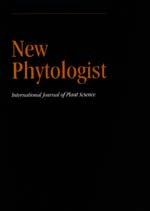Crossref Citations
This article has been cited by the following publications. This list is generated based on data provided by
Crossref.
Sprent, Janet I.
and
Parsons, Richard
2000.
Nitrogen fixation in legume and non-legume trees.
Field Crops Research,
Vol. 65,
Issue. 2-3,
p.
183.
Rillig, Matthias C.
Treseder, Kathleen K.
and
Allen, Michael F.
2002.
Mycorrhizal Ecology.
Vol. 157,
Issue. ,
p.
135.
Sharmila, P.
and
Saradhi, P. Pardha
2002.
Techniques in Mycorrhizal Studies.
p.
469.
Schortemeyer, M.
Atkin, O. K.
McFarlane, N.
and
Evans, J. R.
2002.
N2 fixation by Acacia species increases under elevated atmospheric CO2.
Plant, Cell & Environment,
Vol. 25,
Issue. 4,
p.
567.
Tian, Chunjie
He, Xingyuan
Zhong, Yang
and
Chen, Jiakuan
2002.
Effects of VA mycorrhizae and Frankia dual inoculation on growth and nitrogen fixation of Hippophae tibetana.
Forest Ecology and Management,
Vol. 170,
Issue. 1-3,
p.
307.
Kovács, G. M.
Vágvölgyi, C.
and
Oberwinkler, F.
2003.
In Vitro interaction of the truffleTerfezia terfezioides withRobinia pseudoacacia andHelianthemum ovatum.
Folia Microbiologica,
Vol. 48,
Issue. 3,
p.
369.
Tudoreanu, L.
and
Phillips, C.J.C.
2004.
Advances in Agronomy Volume 84.
Vol. 84,
Issue. ,
p.
121.
Gamper, Hannes
Peter, Markus
Jansa, Jan
Lüscher, Andreas
Hartwig, Ueli A.
and
Leuchtmann, Adrian
2004.
Arbuscular mycorrhizal fungi benefit from 7 years of free air CO2 enrichment in well‐fertilized grass and legume monocultures.
Global Change Biology,
Vol. 10,
Issue. 2,
p.
189.
Alberton, Odair
Kuyper, Thomas W.
and
Gorissen, Antonie
2005.
Taking mycocentrism seriously: mycorrhizal fungal and plant responses to elevated CO2.
New Phytologist,
Vol. 167,
Issue. 3,
p.
859.
Gamper, Hannes
Hartwig, Ueli A.
and
Leuchtmann, Adrian
2005.
Mycorrhizas improve nitrogen nutrition of Trifolium repens after 8 yr of selection under elevated atmospheric CO2 partial pressure.
New Phytologist,
Vol. 167,
Issue. 2,
p.
531.
Knepp, Rachel G.
Hamilton, Jason G.
Mohan, Jacqueline E.
Zangerl, Arthur R.
Berenbaum, May R.
and
DeLucia, Evan H.
2005.
Elevated CO2 reduces leaf damage by insect herbivores in a forest community.
New Phytologist,
Vol. 167,
Issue. 1,
p.
207.
Heinemeyer, A.
Ineson, P.
Ostle, N.
and
Fitter, A. H.
2006.
Respiration of the external mycelium in the arbuscular mycorrhizal symbiosis shows strong dependence on recent photosynthates and acclimation to temperature.
New Phytologist,
Vol. 171,
Issue. 1,
p.
159.
Von Holle, Betsy
Joseph, Katherine. A.
Largay, Erin F.
and
Lohnes, Rebecca G.
2006.
Facilitations between the Introduced Nitrogen-fixing Tree, Robinia pseudoacacia, and Nonnative Plant Species in the Glacial Outwash Upland Ecosystem of Cape Cod, MA.
Biodiversity and Conservation,
Vol. 15,
Issue. 7,
p.
2197.
Ziska, Lewis H.
and
Bunce, James A.
2006.
Plant Growth and Climate Change.
p.
17.
Tang, Jianjun
Chen, Jing
and
Chen, Xin
2006.
Response of 12 weedy species to elevated CO2 in low‐phosphorus‐availability soil.
Ecological Research,
Vol. 21,
Issue. 5,
p.
664.
Saxena, Anil Kumar
Shende, Rasika
and
Grover, Minakshi
2006.
Microbial Activity in the Rhizoshere.
Vol. 7,
Issue. ,
p.
121.
Phillips, Richard P.
and
Fahey, Timothy J.
2006.
TREE SPECIES AND MYCORRHIZAL ASSOCIATIONS INFLUENCE THE MAGNITUDE OF RHIZOSPHERE EFFECTS.
Ecology,
Vol. 87,
Issue. 5,
p.
1302.
Van Bloem, Skip
Schlesinger, William
and
Thomas, Richard
2006.
Agroecosystems in a Changing Climate.
Vol. 20062456,
Issue. ,
p.
85.
Ferrari, Alejandro E.
and
Wall, Luis G.
2007.
Nodulation and growth of black locust (Robinia pseudoacacia) on a desurfaced soil inoculated with a local Rhizobium isolate.
Biology and Fertility of Soils,
Vol. 43,
Issue. 4,
p.
471.
Kuhad, Ramesh Chander
Kothamasi, David Manohar
Tripathi, K. K.
and
Singh, Ajay
2008.
Plant Surface Microbiology.
p.
71.


